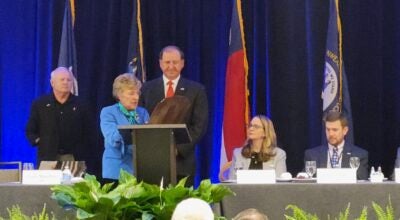City rejects subdivision zone change
Published 1:18 pm Friday, March 18, 2022
The Danville City Commission denied a proposed zone change for a subdivision in north Danville between the Candlewood and Colonial Heights subdivisions.
The planning and zoning commission had previously made their recommendation for this zone change from R1A to R1C at 0. Hartland and 0. Ridgeview. The change allowed for smaller lot sizes and would have provided more affordable housing in the town.
Commissioner Denise Terry made the motion to deny the zone change because the planning commission did not account for how the development would affect both subdivisions immediately adjacent to the property.
Commissioner Jennie Hollon and Mayor Mike Perros voted not to deny; Commissioners Kevin Caudill, Terry, and J.H. Atkins voted to deny.
Neighbors in the Colonial Heights subdivision had voiced opposition in previous meetings about the zone change, stating that it would not be compatible with the neighborhoods. They also raised concerns about the lack of information about what the development would look like.
Developer Joedy Sharpe had previously said the development would likely fit 121 homes. Terry expressed concern that Sharpe did not commit in writing to having 121 lots. She said the agreement of up to five units per acre on 32 acres technically allows for 160 homes.
Since that acreage agreement is in writing, it is not in concert with the comprehensive plan being that home density should not exceed 50% of surrounding neighborhoods. That density would exceed the Colonial Heights neighborhood.
Commissioners said the subdivision would have to have similar characteristics to neighborhoods on the north, south, east and west sides. Most of the surrounding residential land is zoned R1A.
Sharpe said they are unsure what the neighborhood would look like until they sit down with an engineer to make a plan.
“That seems kind of backwards to me; it seems like we should have a pretty clear idea of what we’re approving when the time for approval comes, and that’s a shortfalling of the ordinance I suppose,” Caudill said.
Attorney Bryan Beauman explained that the city’s ordinance calls for a general plan for a zone change. He read the ordinance, which states, “The general development plan is intended to demonstrate to the planning commission the character and objectives of the proposed development in adequate detail for the planning commission to evaluate the development and to determine what shall be binding on the use and development of the property in question.”
The planning and city commissions have to determine if proposals provide enough detail about how the development will affect neighborhoods and the community. Commissioners believed it did not provide enough information, which they said has been a problem in the past.
“We’ve had a few of these issues come up in the last couple of years, and I believe this is an indicator of the real problem, which is we need to go back to our comprehensive plan and update it,” Terry said.
Since denied, Sharpe could move forward with a development on the R1A zoning without specific restrictions that the city can impose, since the land is already zoned residential. Sharpe can also reapply for the change, making adjustments that the city talked about, if the application is not identical to the one already submitted.
Planning and Zoning Director Steve Hunter explained that a developer can withdraw the application before the commission takes final action to deny, and resubmit it the same way. After final action, an applicant cannot resubmit the same application for one year, unless it differs from the one already submitted.
“When you deny it, you deny what Economic Development has been requesting,” Sharpe said.
In a previous meeting, Terry and other commissioners had spoken about the need for more affordable housing in Danville, which is something that Economic Development had asked from Sharpe.
“We are the last layer of protection for the citizens of this community,” Terry said. “While we want and need development, we cannot do development at the expense of anyone else or especially existing developments.”
In other business, the city commission:
• Heard an update about parks and recreation projects. Tennis courts for the fairgrounds will be designed in March and construction will begin in June.
Terry had concerns about the fast rate of progress on the tennis courts. She said she was not aware of the project’s urgency, as the commission has not approved a design for it.
“I certainly did not understand that the tennis courts were going to be constructed within three months from now,” she said.
City Manager Earl Coffey said staff moves forward with projects that are part of the parks master plan from 2018. He said they had discussed last year about constructing tennis courts at the fairgrounds in spring of this year. Since the fair is happening in June, construction will start when it ends. The city will use the courts as a shared resource with schools, and they want it done in time for the next tennis season.
City Engineer Josh Morgan said they want to move forward with parks projects individually, not all at once. Projects will be designed and implemented over the years to come. The commission will be presented with more information about design for the tennis courts and other projects soon.
• Approved a fee increase of $190,040 for Bayer Becker to move to the next phase for schematic designs for Jenny Rogers and the fairgrounds.
• The city plans to remove asbestos floor tiles in Jenny Rogers.
• The planning commission approved new subdivision regulations to be put in effect June 1. The regulations have a more well-defined inspection process for developers; allows for five-foot sidewalks instead of four; allows for a shared street concept for pedestrians to walk on the street; and allows for roadside drainage instead of a curb and gutter.
• Hired Abby Clark as telecommunication officer.
• Reappointed Susan Megilligan to the CVB board. She is the hotel representative for the board. Her term will expire in March 2025.
• Approved a contract proposal for Parks and Recreation to start selling Pepsi products. They have sold Coke products for about 20 years. The city will receive $5,000 of Pepsi store credit up front, and after five years, will receive $2,000 of store credit every year.
“It’s an opportunity for us to bring in a new product, and what really sold us was the in-store credit we would be receiving back from Pepsi,” said Parks and Recreation Director Evan Teague.







